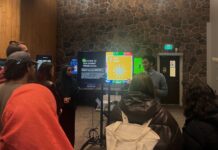The first event in the Waterloo’s English department’s Faculty Research series, “Mediated Bodies,” was held Oct. 5 in Hagey Hall. </p>
The event was hosted by associate professors Beth Coleman, author of Hello Avatar: The Rise of the Networked Generation, and Jay Dolmage, author of Disability Rhetoric, as they lectured on the topic of their recent publications.
This well-attended event poignantly intermingled Coleman’s work on the role of the avatar in a digital society with Dolmage’s research on the accessibility of rhetoric, in order to initiate discussion surrounding the role of the body in both a physical and virtual sense.
Hello Avatar seeks to promote discourse amongst its readers on the emergence of what Coleman called the “X-reality”: a concept which merges together the informational and physical worlds to create a new kind of online dynamic. In a multi disciplinary lecture marrying technology, philosophy, and literature, Coleman engaged her audience by reflecting the multi-dimensional needs of our contemporary society.
“What I want to talk about is the emergent phenomenon of technological emersion and the shaking of mediated selves not as an exception, but the growing standard of contemporary life with pervasive computing,” stated Coleman.
Along with her work on the role of the avatar, Coleman addressed issues of online anonymity and the responsibility that comes with the digital age. There is a lot of discourse these days which questions the validity of online networks and whether or not the benefits outweigh the drawbacks. Is disconnection from the physical reality a byproduct of an increased connection to the realm of X-reality, and should one take precedence over the other? Coleman stated that the key in ensuring positive use of these information resources is creating ethical communities capable of withstanding and overriding the dehumanization which comes with online anonymity.
Shifting the discussion from the X-reality back into tangible reality, Dolmage opened by reintroducing the concept of rhetoric. He gave it a definition which conjures up not images of Mark Antony’s “public prostitution” (to quote Cicero), but elevates rhetoric to being the study and analysis of communication. Disability rhetoric comments on our society’s tendency to push aside what we perceive as being outside the normative standard, and in turn, examines the historical neglect surrounding bodily variation and the links between rhetoric and power.
“I looked around and didn’t see disability anywhere, so I thought, ‘this can’t be right,’ ” said Dolmage. “I’m interested in the way that disability is represented in popular culture and media, and trying to help people have better ways of representing disability more realistically.”
By examining an alternate history which looks at disability not as a dilapidated self but simply a varied self, Dolmage urged for not only increased representation but accessibility as well. Dolmage, who is on the hiring committee for Waterloo’s new accessibility officer as well as involved in the planning of Hagey Hall’s new central elevator, had this to say when asked how the school measures up: “We have a lot of work to do. I think there are ways that Waterloo accommodates certain ways of thinking that other universities might not, but any university is very narrow in terms of that.” However, with the instalment of Hagey Hall’s new student elevator, Waterloo is changing the conversation in terms of campus accessibility.































